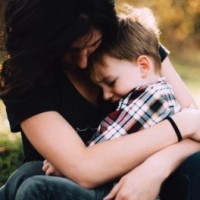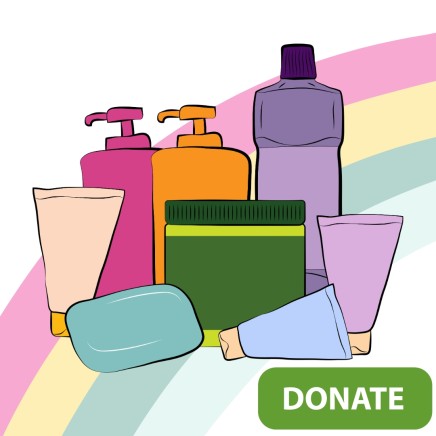 During the pandemic and associated lockdowns, life for those living with domestic abuse was exacerbated as abusers often had more control and victims had fewer opportunities to seek help. The lockdowns increased isolation, making it even more difficult for those in abusive relationships to escape and find the support they needed. Lockdowns and stay-at-home orders, intended to curb the spread of COVID-19, inadvertently trapped many individuals in abusive households. Reports indicated a sharp rise in domestic violence cases as families were confined to their homes. The heightened stress, financial strain, and social isolation associated with the pandemic created a volatile environment where abusers exerted more control, leaving victims with fewer opportunities to seek help. Escaping an abusive environment is fraught with complexities and dangers. For Yvonne*, the immediate challenge was to find safety for her and her two young children.
During the pandemic and associated lockdowns, life for those living with domestic abuse was exacerbated as abusers often had more control and victims had fewer opportunities to seek help. The lockdowns increased isolation, making it even more difficult for those in abusive relationships to escape and find the support they needed. Lockdowns and stay-at-home orders, intended to curb the spread of COVID-19, inadvertently trapped many individuals in abusive households. Reports indicated a sharp rise in domestic violence cases as families were confined to their homes. The heightened stress, financial strain, and social isolation associated with the pandemic created a volatile environment where abusers exerted more control, leaving victims with fewer opportunities to seek help. Escaping an abusive environment is fraught with complexities and dangers. For Yvonne*, the immediate challenge was to find safety for her and her two young children.
There has been a 10% increase in reports of domestic violence during the Covid-19 pandemic, with around 20% of all offences recorded by police being flagged as domestic abuse related.
Office for National Statistics (ONS)
The Escalation of Abuse
Before the pandemic, Yvonne had been considering leaving her abusive partner, but the lockdown orders in March 2020 forced her to stay. As the pandemic progressed, her partner’s behaviour worsened. The stress of job loss and confinement amplified his abusive tendencies, leaving Yvonne and her children in constant fear.
Barriers to Seeking Help
Limited Access to Support Services: Yvonne's attempts to reach out to local shelters were met with disappointment. Many were operating at reduced capacity due to social distancing requirements, and she was placed on long waiting lists. Her partner’s constant presence at home made it difficult for her to access online counselling or hotlines without risking further abuse.
Economic Instability: Yvonne lost her job as a part-time retail worker early in the pandemic, and her partner controlled the family's finances. Without a stable income or savings, Yvonne felt trapped, unable to afford the costs associated with leaving and being able to provide for her children.
Health Risks: The fear of contracting COVID-19, especially with two young children, was a significant deterrent. Yvonne worried about their health and well-being, adding another layer of complexity to her decision to leave.
Seeking Refuge
Yvonne's decision to leave came with significant risks, but she was desperate for a way out. In fear for her and her children's lives and to ensure their safety, she pretended to take a walk. With no time to gather belongings she left her home with no belongings.
SOS for Support
Yvonne and her children were placed in emergency accommodation where they could quarantine and receive support services, so she could start rebuilding her life. The psychological impact of the abuse and the pandemic had taken a heavy toll. The isolation from her support network, combined with the constant threat of violence, led Yvonne to experience severe anxiety and depression. Her children, witnessing the abuse and disruption, also exhibited signs of trauma, such as nightmares and withdrawal.
We received an SOS order from a social worker from a local housing association who was deeply concerned by Yvonne and her children and was supporting them during this incredibly difficult time. Despite it being after hours, we understood the gravity of the situation, and swiftly reopened our office. Within hours, we were able to gather and deliver; warm winter coats, clothing, underwear and socks, pyjamas and toiletries.
Paving the Path to Recovery
The assistance we provided was more than just a short-term solution; it was a catalyst for change. The timely delivery of these essential items played a significant role in helping Yvonne and her children begin their journey towards recovery. Having their basic needs met allowed Yvonne to focus on other pressing issues, such as securing long-term housing and finding employment. The psychological relief of knowing that her children were warm and clothed was immense, allowing her to concentrate on rebuilding their lives. By meeting their immediate needs, we helped create a foundation upon which she could build a safer, more stable future for herself and her children.
Help us Support more people like Yvonne
The heart-wrenching situation Yvonne and her children faced is, unfortunately, far from unique. During the COVID-19 pandemic, the number of families struggling with domestic abuse rose alarmingly. Between April and July 2020, calls to the National Domestic Abuse Helpline surged by 65%, and the police recorded over 200,000 domestic abuse-related calls between March and June 2020 alone. Yvonne’s story is however an example of how timely support can transform lives. With the right resources, survivors of domestic abuse can find safety, regain their independence, and rebuild their lives.
How You Can Help
Your contributions have a direct and immediate impact. By donating items or financial resources, you help us provide essential support to families in crisis. This assistance not only addresses their immediate needs but also paves the way for long-term recovery and stability.There are various ways you can support our work:
Donate Essential Items
- Toiletries: Personal hygiene products are always in high demand. Items like soap, shampoo, toothpaste, and sanitary products are crucial for maintaining dignity and health.
- Clothing: New or gently used clothing, especially warm winter gear, underwear, socks, and pyjamas, can make a significant difference in the lives of those fleeing abusive situations.
Financial Support
- Donations: Monetary contributions allow us to respond quickly to urgent needs and support a greater number of families. Every donation, no matter the size, helps us provide critical resources.
- Fundraising: Organise a fundraising event or campaign to support Goods For Good. Whether it's a virtual event, a sponsored run, or a community bake sale, your efforts can help raise much-needed funds.
- Sponsorship: Partner with us through our Humanitarian Aid Partnership Scheme. Your business can make a meaningful impact by supporting our initiatives and helping us reach more families in need.
*Yvonne's story is real and based on true events however, in order to protect her identity her name has been changed and the photos used are stock imagery courtesy of Jordan Whitt.
Keep in touch
Join our community and receive news and updates from the Goods For Good headquarters.
